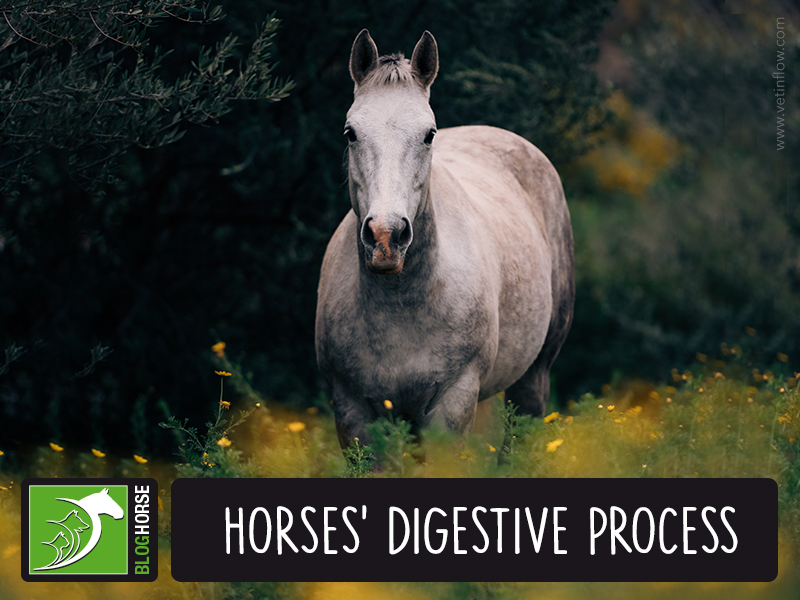
Horses' Digestive Process

Horses are herbivorous animals that have a very complex and sensitive digestive system. As with all animals, proper nutrition is vital for their wellness and health.
Let's do a simple overview of the horses' digestive process!
There are some things in common between horses' and our digestion: it will start in the mouth, where food is grabbed, chewed and then off it goes into the stomach lubricated with salivary digestive enzymes to help the digestive process. In the stomach, the process continues with other enzymes, acid and lots of mixing so food can now reach the small intestine in bits tiny enough to be broken down into usable nutrients like fats, glucose and amino acids.
So far, so good! This process is familiar to all of us.
But it's when the food particles reach the large intestine that things get a lot different. Horses, unlike us, have the ability to digest cellulose from plants. But actually, even though they get all the credit for it, they are not the ones doing it! Cellulose (fibre) is digested by microorganisms, bacteria and protozoa, present in the caecum, a 30 litre intestinal fermentation chamber, where all the magic happens. The fibre is then transformed into volatile fatty acids which are absorbed and provide an important source of energy for horses.
What this means is, when we're feeding our horses we have to make the horses happy and the fermenting microorganisms happy as well! Otherwise, we will start seeing problems like poor performance and even severe health issues, such as weight loss or obesity, colic, founder, osteoarticular issues, gastrointestinal ulcers, among others.
Here is an example: before domestication, horses pretty much spent their whole day eating the same thing. It would be either that or roaming to find a new place to eat! So over time, their digestive systems evolved to perfectly deal with the naturally available food. With domestication, horses are usually enclosed in pastures, paddocks and barns which keeps them from roaming and grazing. Also, their caloric needs are different. Some days horses will need more calories as they spend more because they are working or performing; other days they'll need less as they're stabled and won't burn as many. As a result, concentrate feed has been introduced in horses' diets to meet their daily caloric intake requirements. However, as concentrate is not a natural food for horses, sometimes gastrointestinal problems may occur.
As you've figured out by now, the number of things that influence the horses' digestive process is pretty big and finding the correct nutritional balance to keep your horses happy and healthy is not easy.
If you need help or if you'd like to know more about equine nutrition, please talk to us!
Would you like to know more about horses? Check our Equine Courses:
Equine courses
Published: 28 Sep 2018
Read the previous article: Could you please stop that?!

